SELECTED PROSE WRITINGS OF MRS. EMMA C.EMBURY
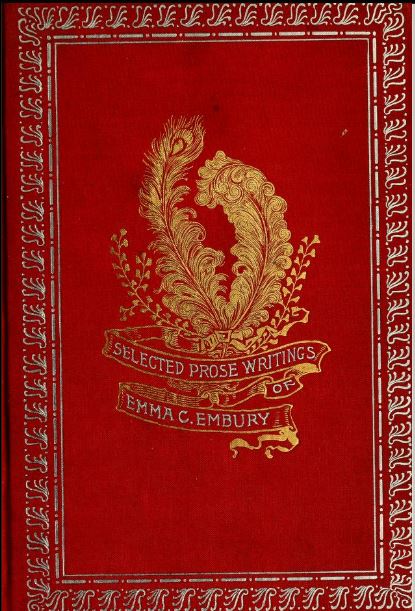
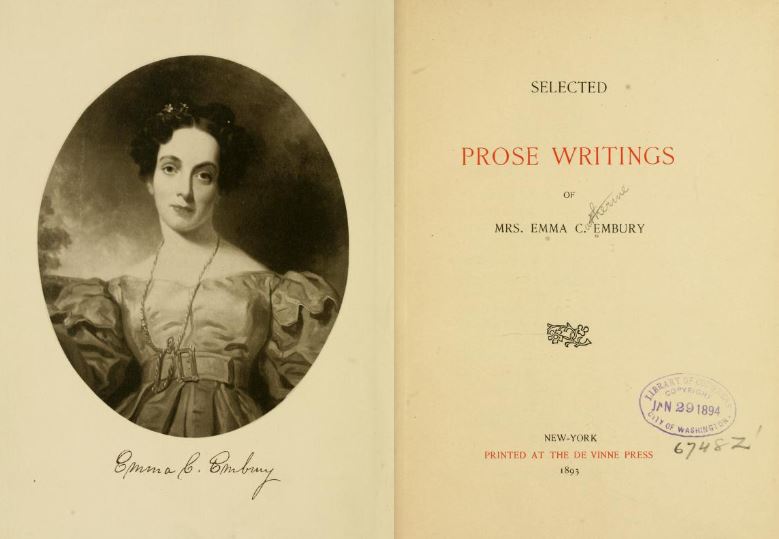
NEW YORK
PRINTED AT THE DE VINNE PRESS – 1893
Copyright, 1893, by Anna K. Sheldon.
PREFACE.
It may be of interest to the reader to know when and where these selections from the writings of Mrs. Emma C. Emhnry were puhlished. ‘Thoughts of a Silent Man’, written under the nom de plume of Rudolph Rertzmann, appeared in a New York weekly paper called the Broadway Journal, in 1845
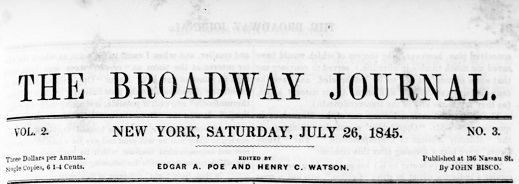
Nemo est meorum amicorum liodie
Apud quem expromerc occulta mea audeam.
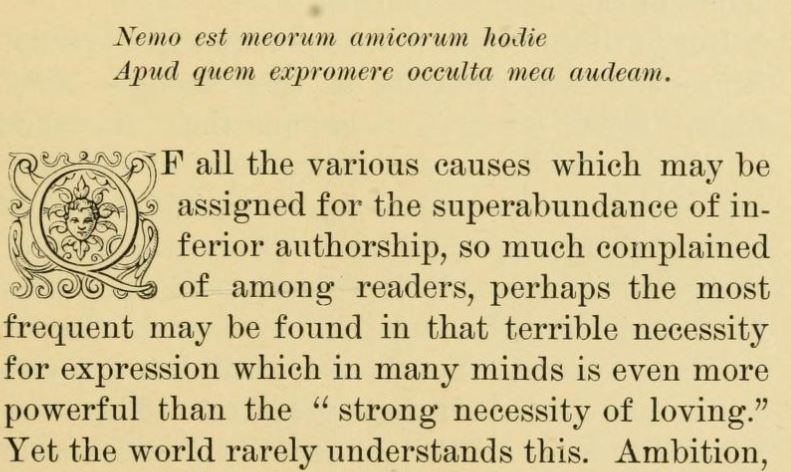
Ambition, avarice, and, above all, vanity, are regarded as propellants to literary labor, while a yearning for sympathy, a desire for repose, an irrepressible longing to claim kindred with congenial hearts are feelings which are rarely believed in or appreciated. The practical part of the world, who live on from day to day, governed only by the exigencies of the moment; and yielding to the expediencies of the passing hour, can have no idea of such needs. They find sufficient utterance in the gossip of petty scandal, the discussion of minor political questions, or the detail of every-day business. They eat, drink, sleep, and read newspapers ; while the real energies of their nature are all expended in the task of gain. They live for bargaining and trading; they feel no vacancy of soul, because they have filled that temple of the living God with the tables of the money-changers.
But to those who think deeply, and feel vividly, expression is a necessity of their being. They must “speak or die.” Some find their utterance in the interchange of socialities, some in discoursing elegant music; some speak in the wordless tints of painting; some few work out the ideal of their souls in the enduring marble, and some send forth their thoughts, winged by poesy, to the far winds of heaven. Yet there are still left many to whom are denied all these resources.
There are some who have all the elements of power within them, but have never had their lips touched with the live coal from the altar, which was to the prophet both inspiration and expression. There are some who seem, like Zacharias, to be struck dumb by the very power which brings the promise of blessing: some to whom self-distrust is an incubus upon the mind, exciting it to an uneasy activity, yet deterring it from utterance. Without putting forth any pretension to the possession of the higher order of such power, I may yet claim to know some thing of the discomforts attendant upon compulsory silence.
I have outlived all the associates of early life, and my unconquerable shyness of temper has prevented me from forming new ones. I have a large circle of acquaintances and many family friends, but not one to whom I can open my inner heart. I have a competent fortune, refined tastes, and, I think, warm affections; yet I lead the life of a hermit so far as social sympathies are concerned. In the opinion of the world I have all the means of happiness within my reach, but all these gifts are marred by the want of a power which is so generally possessed, that, like the blessings of light and air, people scarcely value it — I mean the power of expressing my over-burdened mind in words. I cannot talk. An unfortunate impediment in my speech, which is always increased by any nervous excitement, is one obstacle; but another, and more insuperable one, is my unconquerable shyness and self-distrust.
I enjoy society with my whole heart. I listen to brilliant conversation (for I number among my friends some of the best talkers I ever heard), and within my own mind I take full part in it. Ready rejoinders, sparkling repartees, unanswerable arguments, profound reflections, high-toned moralizing, and all the varied forms of spoken eloquence are wrought out in the chambers of mine imagery. Sometimes I delude myself with the belief that I have really contributed my proportion of amusement to the social circle. My fancies are so vivid that it often seems to me as if I had actually uttered all the fine things which have been passing through my mind.
I have often pleased myself with such a belief, and have experienced for a moment all the satisfaction of a man who has acted well his part in society, until some trivial recollection has brought me back to the consciousness that mine had been only an “imaginary conversation,” a sort of a vivification of birth-strangled ideas. How can one like me find expression? My mind is too active for continued silence; it hives up stores of knowledge, it accumulates masses of facts, it fashions images of beauty, it works out conceptions of goodness and greatness. Why then must it be ever dumb, when it would utter the oracles of nature and truth?
I am resolved. I will take my humble pen, and, surrounded by my books, those quiet friends whose silence is so suggestive, I will imprison in written words the busy fancies which so disturb my peace. Crude and ill-arranged as my ideas may seem, they will perhaps give out glimpses of something better to come. There is more in me than I can now litter, but a true word was never yet spoken in vain, and it may be that someone will become the happier for having picked up a rough-hewn thought from my quarry.
I do not flatter myself that mine is an unusual case, or that I possess the genius which demands freedom. There is no condition of life to which the history of human nature does not afford numerous parallels, and one of the grand mistakes which make the wretchedness of mortals is the belief in a peculiar destiny of suffering. Therefore know that thousands have felt as I do, and could doubtless have expressed their feelings better. As for genius, that is a gift of God, vouchsafed once in an age to the world. Men of talent may be counted by hundreds, men of learning by thousands, but men of genius must still be numbered by tens, although the world is six thousand years old. Besides, genius comes with a commission from the Most High; it cannot be silent, even if it would.
But I am wearied of ceaseless commune in the shyness of my own heart, wearied of perpetual activity and unbroken silence. I would fain speak, aye, speak without feeling the eye of ridicule scorching my cheek, without having my ear pained by the half-inarticulate sounds that fall from my stammering lips, without feeling in every vein the throb of that terrible silence which always follows my attempts at vocal utterance. It may be that old age is creeping upon me apace, and that I grow garrulous as I grow gray. It may be that I am mistaken in thinking I have anything to say. If so, I shall soon learn my error, for nothing is so severe a trial of one’s crude fancies as the sight of them in print. We all have our imaginings, but when the “soul of our thoughts ” first appears before us inactual form and type, we feel very much as if we looked upon an apparition from the world of shadows, and, like the witch of Endor, we are terrified before the specter we have ourselves called forth.
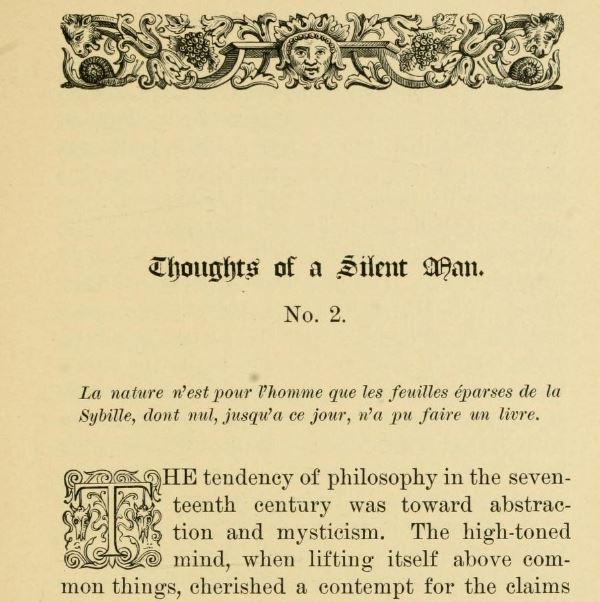
THE tendency of philosophy in the seventeenth century was toward abstraction and mysticism. The high-toned mind, when lifting itself above common things, cherished a contempt for the claims of ordinary humanity, and lost itself in the pure vacuum of abstract truth; while the restless and fanciful thinkers of the age, unable to plume their wings to so bold a flight, reached only to the cloudy regions of mysticism, and, like the traveler on the Hartz Mountains, beheld their own shadows magnified into giants by the fog.
The course of the human mind is onward, but it pursues a very winding way. Accordingly, we find the succeeding century marked by a spirit of analysis and skepticism. Nothing but demonstrable truth was received. The mind, the organ of intelligence, was alone called into exercise; while doubt was thrown upon the very existence of the soul, that dweller in the inner temple, that recipient and exponent of God’s truth through conscience.
In the progress of the human intellect, we now behold another phase. The present is eminently the age of inquiry. Men speculate upon everything; they seek to generalize all things. Every fact in nature, every truth in physics, is made the nucleus of a theory, which, whether true or false, finds ready receivers. He who is content to satisfy his mind with the exact sciences, and his soul with trusting faith, is regarded as one who lingers last in the march of intellect. The habit of theorizing upon every discovery in art or science has given to the faculty of imagination a much higher rank in the scale of mental power than philosophers of former times were willing to allow. In some men this faculty has all the power of a separate and distinct mind — a sort of “double,” or ghost, of the faculty of reason. Formerly men of imagination were poets, novelists, or painters; now we find them philosophers, metaphysicians, and mechanicians. Once the highest province allotted to the imagination was the privilege of decorating truth; but now it often happens that while reason busies herself in defining, arranging, and combining some abstract theory, imagination is employed in analyzing and assimilating the truths of science. But as, in former times, the spirit of analysis led by imperceptible gradations to skepticism, so it seems to me that, in modern days, the habit of generalization tends decidedly toward materialism.
Take for instance a book recently published, which, for lucid arrangement, and admirably sustained generalization, is unsurpassed by any work on the same subject — I mean ”Vestiges of the Natural History of Creation.”
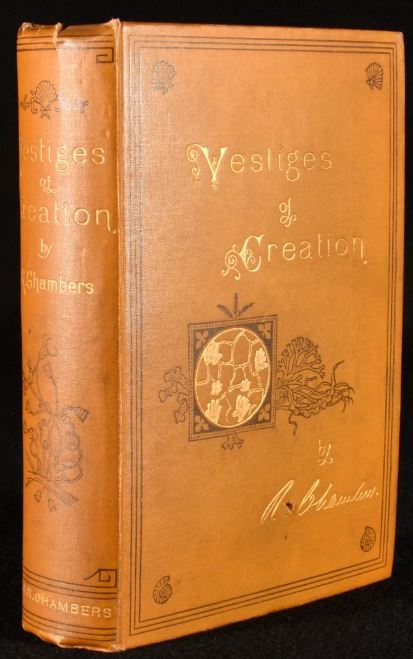
It contains no new facts, but is filled with groups of facts (so to speak) which come to us as new, because they appear so striking in their arrangement. The author is no materialist ; on the contrary, he takes great pains to disclaim all such tendencies, yet what a storehouse of materialism would his book afford to one who doubted every truth which did not come through the intellect. His own faith in his theories adds an irresistible charm to his arguments, and it requires a most determined examination of truth to distinguish in many instances the workings of his imagination from the action of his reason. His system of progression has no limit short of Deity, and notwithstanding the experience of thousands of years tells us that, however the human mind may have advanced, the physical structure has known no other changes than such as are made by climate and modes of life, he talks of that perfect type of Divinity to which man may hereafter attain.
Have we not already had in the Incarnate Divinity the most perfect type of exalted ” Humanity “? Or can it be believed that when God was made man, and dwelt among us/’ he wore the semblance of an inferior humanity, which to the nobler race destined to succeed us will seem as degraded in the scale of being as do the various tribes of Simia in comparison with the present race of mankind ?
In his theory of the geological and vegetable transformations many discoveries in science seem to bear him out, and although facts might be adduced which would at least throw some doubt upon it, yet his picture of creation at the period of “carboniferous formation” is so sublime that we would fain believe it as true as it is grand. Its suggestiveness is positively overpowering. He has given us only a few noble strokes of the pencil, but it would require all the genius of a Milton to fill up the outlines he has traced. When he applies his system to animate nature, however, we feel its fallacy. The merest tyro in physiology can bring the most decided testimony against him. All the laws of nature (as they are called) prove the impossibility of generating superior races from inferior ones, or even of producing, from the union of the two, a species capable of continuous reproduction. It may be answered that the Almighty, who made those laws, is superior to them, but this does not settle the question, since, if we believe in a departure from the laws of progression in a single instance, we may as well believe in the miracle of instantaneous creation.
There is something frightful to feeble human nature in the idea of necessity ruling with iron rod over earth’s helpless children. How can we imagine Heaven filled only by an infinite Intelligence to which we are but as atoms of dust on the rolling wheel of progression? A finite mind shrinks before such a fearful truth. Jean Paul has given us some idea of such a state of orphanage in his terrific ” Dream.” His powerful imagination has carried the horrors of atheism into the world of spirits.
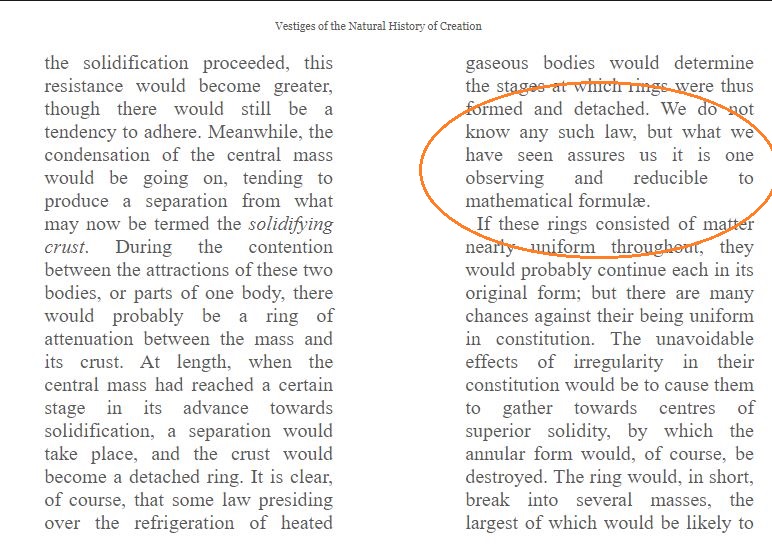
He brings before us a vision of the souls of buried children, wandering blindly through a dark, vague space, and calling vainly upon a Heavenly Father, while the voice of the risen Christ mournfully replies, “We are all orphans — we have no Father in Heaven.” He who first called God our Father knew more of the human heart than the most profound thinkers. His book is one of great power, and greater suggestiveness; yet one of his readers, at least, closed the volume with a feeling of deep sadness. As I sate in my lonely room pondering over its facts and fancies, my thoughts shaped themselves into the language of earnestness, which is poetry; and, safe in my own insignificance, I thus spake out.
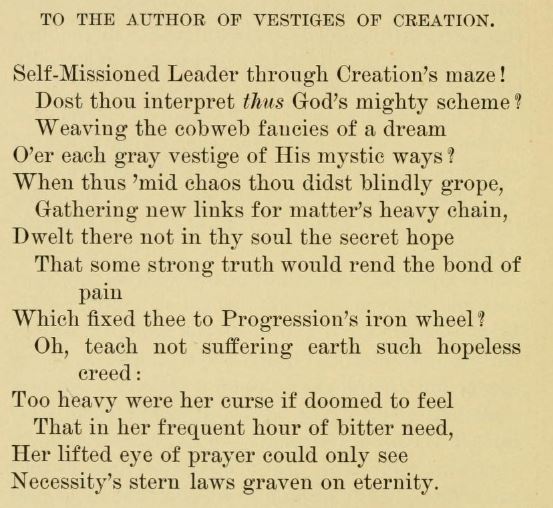
Continue reading